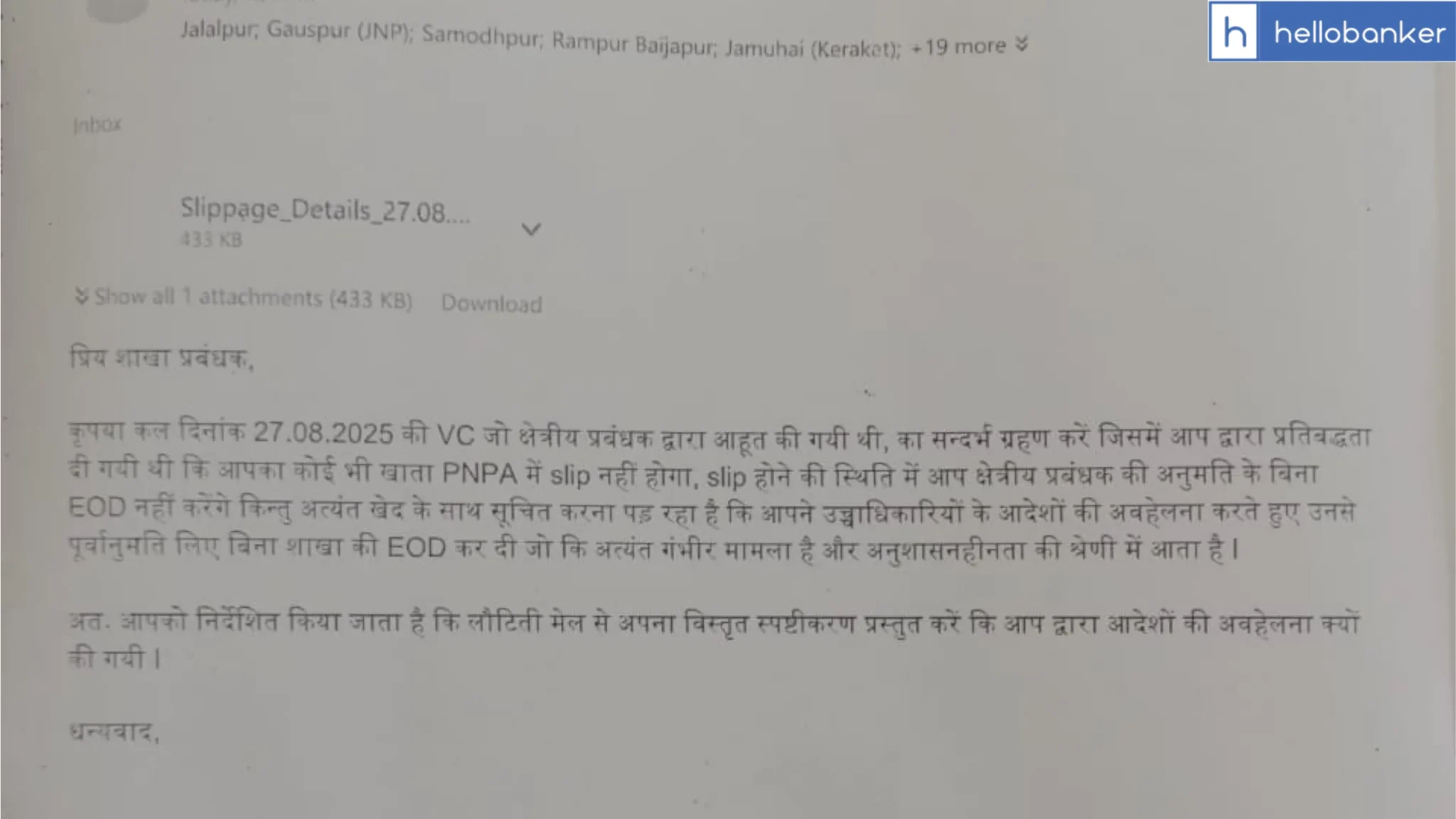Jaunpur: Users on social media are voicing their criticism of the Uttar Pradesh Gramin Bank (UPGB) following the issuance of a notice to a branch manager for closing a loan account without prior approval. The Regional Office termed this action as indiscipline, pointing out that proper procedures were ignored. This instance has sparked a larger conversation about responsibilities within the banking sector.
Uttar Pradesh Gramin Bank’s Controversial Decision
Recently, the Uttar Pradesh Gramin Bank’s Regional Office in Jaunpur found itself in the center of a controversy after a branch manager was issued a notice for not adhering to directives issued during a video conference. According to the notice, the manager was expected to seek permission from the regional head before closing any loan account that slips into a Non-Performing Asset (NPA) category. This protocol is in place to ensure accountability and proper communications within the banking sector, especially in sensitive cases where borrowers default.
The immediate repercussions of this incident are twofold. On one hand, the branch manager is now required to provide a written explanation as to why these orders were disregarded. On the other hand, this has drawn public attention on social media, where users have started to question the banking institution’s internal governance and how its policies are enforced.
Understanding the NPA Dynamics
In the context of banking, a Non-Performing Asset (NPA) refers to a loan or advance for which the principal or interest payment remains overdue for a period of 90 days. Users on social media have pointed out that while it is critical for the bank to follow its protocols, the ultimate responsibility for loan repayment lies with the borrower.
Customers often experience genuine difficulties that prevent them from making timely payments. Factors like unexpected medical emergencies or job losses contribute significantly to defaults. In such cases, the role of the Branch Manager becomes pivotal. They are tasked with monitoring sensitive accounts closely, taking timely recovery measures, and escalating issues to higher authorities when necessary.
This current issue showcases how the banking sector must balance operational protocols with an understanding of customer circumstances. Ignoring this balance could lead to damaging not only the bank’s reputation but also trust within the community it serves.
The Role of Account Managers in the Banking Sector
The Branch Manager holds a crucial position in the banking hierarchy, acting as the first line of defense against defaults and the face of the bank for customers. They are responsible not only for managing finances but also for building relationships with borrowers. This includes offering advice and support that can help customers avoid falling into the NPA category.
Consider the case of Priya, a small business owner who relied on a loan from UPGB to expand her local retail operation. After facing supply chain disruptions and losing a few key clients due to unforeseen circumstances, Priya struggled to make her loan payments. Her Branch Manager took a proactive approach by developing a repayment plan that provided short-term relief. This not only helped Priya stay afloat but also contributed positively to the bank’s bottom line.
Contrastingly, if a Branch Manager fails to monitor and engage with their clients effectively, the bank risks losing valuable relationships and, consequently, revenue. This incident at UPGB serves as a reminder of the critical balance that must be maintained within the banking industry.
Customer-Centric Practices in Banking
As the banking sector evolves, there has been a growing emphasis on customer-centric practices. This situation invites further scrutiny on how banks, including UPGB, implement these practices. Are there sufficient channels for customers to communicate their challenges? Are managers adequately trained to handle sensitive situations?
Furthermore, the need for proper guidelines that outline the responsibilities of both customers and bank officials comes to the forefront. A review of these practices could prevent similar issues in the future.
In an age where social media has the power to amplify concerns, the banks’ quick and transparent response to this incident will play a crucial role in how they are perceived by the public. Creating an organizational culture that emphasizes both accountability and customer empathy is essential for restoring trust.
Conclusion: The Path Forward for UPGB
The recent action taken by the Uttar Pradesh Gramin Bank has opened up a broader dialogue about accountability, responsibility, and the customer experience in the banking sector. While it is essential to uphold institutional guidelines, fostering communication and providing support to borrowers should not be overlooked.
As UPGB moves forward, it will be critical for the branch to address these internal issues effectively. A shift towards a more customer-focused approach, while ensuring adherence to bank policies, may not only resolve current tensions but also reinforce the bank’s standing in the community. This dual focus can drive better outcomes for both borrowers and the bank, ultimately contributing to a healthier Indian economy.
What Does This Mean for Me?🤔
- Salaried Person → Potential job instability or changes in management policies.
- Business Owner → Increased scrutiny on compliance and management accountability.
- Student → Student may face delays in loan processing or approvals.
- Self-employed → Potential loan difficulties if branch operations are impacted.
- Homemaker → Potential loan issues may affect household finances negatively.
- Retiree / Senior Citizen → Bank branch stability may affect retirees’ access to funds.
- Job Seeker → Job seeker perceptions of bank’s management practices may shift.
- Farmer / Rural Citizen → Potential loan delays and reduced banking services for farmers.
Research References📚
📲 Stay ahead in banking & finance!
Join the Bankerpedia WhatsApp Channel for instant updates, and
subscribe to our YouTube Channel for in-depth analysis and expert explainers.









